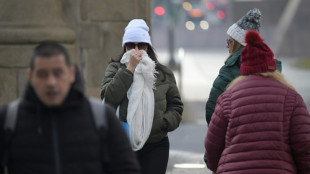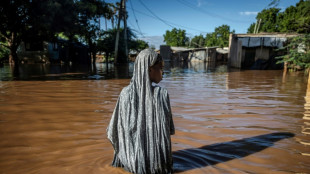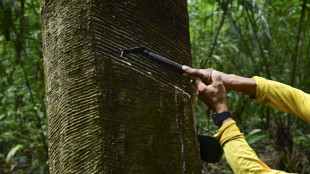Firefighting plane pilots die in Greece crash as wildfires rage
Two pilots died when their water-bombing plane crashed while battling a blaze on the Greek island of Evia on Tuesday, as wildfires flared across the Mediterranean.
Greece's fire department said the Canadair aircraft crashed into a ravine close to where the fire started on Sunday. Footage on state TV ERT showed the plane clipping a tree before falling nose-first and exploding.
The pilots were members of the Greek air force, and the defence ministry said it had declared a three-day mourning period.
The plane was among at least three other aircraft and around a hundred firefighters confronting the flames on Evia.
The accident took place as Greece battled wildfires on three major fronts, including the tourist islands of Rhodes and Corfu, with many of the country's regions listed at extreme risk of dangerous forest fires exacerbated by strong winds.
Scientists from the World Weather Attribution group said Tuesday the heatwaves that have hit parts of Europe and North America this month would have been almost impossible without human-caused climate change.
"We have another difficult summer ahead of us," Greek Prime Minister Kyriakos Mitsotakis told his cabinet.
Three days before the plane crash, Mitsotakis acknowledged that the aged Canadair CL-215 water bombers used by Greece -- a model first produced in the mid-1960s -- were "old, difficult (to fly) and prone to malfunction."
He had vowed to bring in new models available in 2026.
WWF Greece on Tuesday said 35,000 hectares (86,500 acres) of forest and other land had been scorched by fire in the country just in the past week.
In the capital Athens the heat is expected to reach 41 degrees Celsius (106 degrees Fahrenheit), and hit up to 44C in central Greece, according to the national weather forecaster EMY.
Vassilis Kikilias, Greece's civil protection minister, said crews had battled over 500 fires around the country for 12 straight days.
Authorities evacuated nearly 2,500 people from Corfu on Monday, after tens of thousands of people had already fled blazes on Rhodes, with many frightened tourists scrambling to get home on evacuation flights.
More than 260 firefighters were still battling flames for an eighth consecutive day on Rhodes, supported by nine planes and two helicopters.
A source at Rhodes airport operators Fraport on Tuesday said the situation had normalised, with traffic levels consistent with the height of the summer season on one of Greece's prime travel destinations.
Some 5,000 people had flown home on more than 40 emergency flights from Sunday to Tuesday, the official told AFP.
Volunteers had come to the aid of foreign tourists in the north of Rhodes where nearly 200 people are still camped out at a school after being evacuated from the fires on Saturday.
"I can't believe they are so nice, they gave so much in every way," said 69-year-old British tourist Christine Moody, who was spending her first vacation in Greece when the fires hit. "I am very moved," she said.
The mercury hit 46.4C in Gythio, in the southern Peloponnese peninsula on Sunday, shy of a 48C national record.
Mitsotakis has warned that the country faced "another three difficult days ahead" before high temperatures are forecast to ease from Thursday.
- 'Protect our home' -
The severe heatwave in Greece has also been reflected across much of southern Europe and Northern Africa.
In Algeria at least 34 people have died as wildfires tore through residential areas, forcing mass evacuations.
Witnesses described fleeing walls of flames that raged "like a blowtorch", and TV footage showed charred cars, burnt-out shops and smouldering scrubland.
In Italy, firefighters spent the night battling wildfires in Sicily, one of which approached so close to Palermo airport that it shut down for several hours Tuesday morning.
Italy's Civil Protection Department on Tuesday reported "extensive fires" across the south.
In the north, a 16-year-old girl on a camping trip was among two people killed by falling trees during violent storms.
"We are experiencing in Italy one of the most complicated days in recent decades -- rainstorms, tornadoes and giant hail in the north, and scorching heat and devastating fires in the centre and south," said Civil Protection Minister Nello Musumeci.
Hundreds of patients across the country have been treated for problems linked to the spike in temperatures, including blood pressure issues, dizziness, and fainting.
L.Olinger--LiLuX



